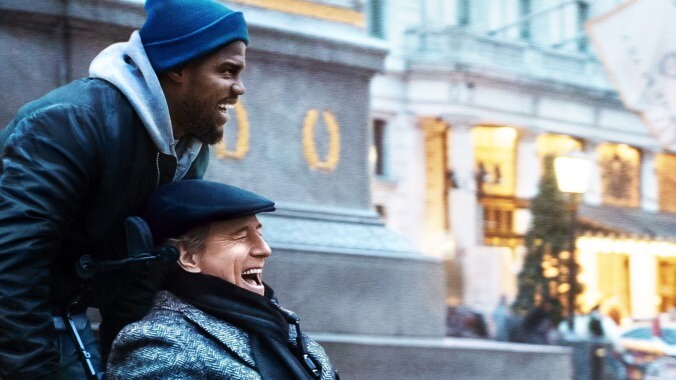Phillip, we learn, has been in a slump ever since the death of his wife, whose terminal cancer diagnosis came not long before his accident. He’s also been carrying on a pen-pal romance with a librarian in Buffalo who may or may not know that he uses a wheelchair—a belabored subplot carried over, with some tweaks, from the original French film. Thankfully, he now has Dell to get him stoned, chauffeur him around New York in expensive sports cars, and generally cause a ruckus in his palatial penthouse as Yvonne and the hoity-toity neighbors roll their eyes. Dell, in turn, learns to appreciate opera and gets to redeem himself by becoming a better father to his young son (Jahi Di’Allo Winston), all while living in the lap of luxury and cashing hefty paychecks—not a bad gig if you can get it.
Originally produced by the Weinstein Company (which also distributed the original film in the United States) and intended for release last spring, The Upside is actually the third remake of The Intouchables; like so many game show and TV singing competitions, Nakache and Toledano’s movie seems to have hit upon a template made for export. However, it should be noted that anyone who needs Kevin Hart to help them loosen up has truly clinical problems; as in his louder mismatched-buddy studio comedies (Get Hard, Central Intelligence, Ride Along, etc.), his screen persona is as easily agitated as nitroglycerin. Which is to say that he’s a long way from Omar Sy, whose winning charisma helped The Intouchables’ success at the global box office (a massive $445 million), but never elevated the film above its basic recipe of bald-faced schmaltz and stereotypes.
Though Jon Hartmere’s script makes some changes to expand the character of Dell (“Driss” in the original), The Upside doesn’t represent an improvement over its predecessor. Burger (The Illusionist, Limitless) directs in a style of uneasy, unassured hackery, lighting up only in a few comic moments; a sequence involving Dell’s attempt to take a shower in a high-tech German-speaking bathroom comes to mind. The rest is feel-good painted unenthusiastically by numbers: a repetitive series of artificially inflated character conflicts and tossed-off resolutions, interspersed with slapstick and jokes about prissy rich snobs, ultimately adding up to far less than the sum of its well-worn parts. Even those who haven’t seen The Intouchables will feel like they’ve seen The Upside twice before it’s over.

 Keep scrolling for more great stories.
Keep scrolling for more great stories.
